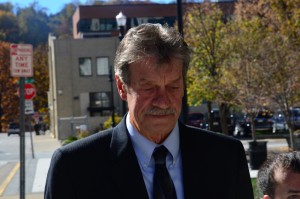Update: Blankenship defense attorneys lose latest effort to limit testimony about ‘The Ross Memo’
November 3, 2015 by Ken Ward Jr.
Former Massey Energy official Bill Ross — a major witness against Don Blankenship — as he leaves the federal building in Charleston at lunchtime Tuesday. Photo by Joel Ebert.
This afternoon should be a major moment in the criminal trial of former Massey Energy CEO Don Blankenship.
When court resumes at 1:30 p.m., Assistant U.S. Attorney Steve Ruby is expected to call to the witness stand Bill Ross — a former MSHA official who after he retired from government service went to work for Massey as a mine ventilation expert.
Readers who are closely following the case know that Ross became an internal whistle-blower of sorts, raising serious concerns about deteriorating safety conditions at Massey operations. We know this — and the government knows it — in part because a memo outlining Ross’s concerns came out when Blankenship sued Alpha Natural Resources to try to force Alpha, which bought Massey in June 2011, to continue paying Blankenship’s legal defense costs. The memo that became public prior to trial, when Blankenship’s defense team filed a motion to try to keep prosecutors from talking about it in their opening statement.
But not to be deterred, lead defense lawyer Bill Taylor gave it another shot late this morning, arguing that U.S. District Judge Irene Berger should seriously limit any testimony from Ross about what even Judge Berger is now calling “The Ross Memo.” Taylor asked for time to argue the issue again, just before prosecutors called Ross to the stand, and Judge Berger sent the jury out for more than a half-hour so she could hear from the attorneys.
Taylor urged Berger to allow Ross to be questioned only about parts of the memo. He proposed a “redacted” version with off-limits portions removed. He also said the government should not be able to discuss in front of the jury the issue of efforts by Massey to keep Ross’s concerns secret, as privileged material protected because of a Massey lawyer’s involvement in discussions with Ross.
Ruby responded that “The Ross Memo” had already been admitted into evidence in the case — and that the defense was simply trying to re-argue an issue it had already lost.
Judge Berger heard these arguments publicly — with the jury out of the room — for a few minutes. Then, she held another fairly lengthy bench conference, a private discussion with the attorneys that the public can’t hear. Then, the judge sent the jurors back to their counsel tables and ruled publicly.
Judge Berger said that the entire memo was fair game for questions of Ross, and reminded both sides that it was in evidence not to prove that the statements made (Ross based part of his concerns on statements made to him by Massey miners, who aren’t identified in the memo and therefore can’t be cross-examined by the defense), but to try to prove “knowledge and notice” on Blankenship’s part to the information contained in the memo:
These are coming in to show that the defendant had knowledge and notice — whatever he may have done with it.
Court resumes shortly …

 Subscribe to the Coal Tattoo
Subscribe to the Coal Tattoo
